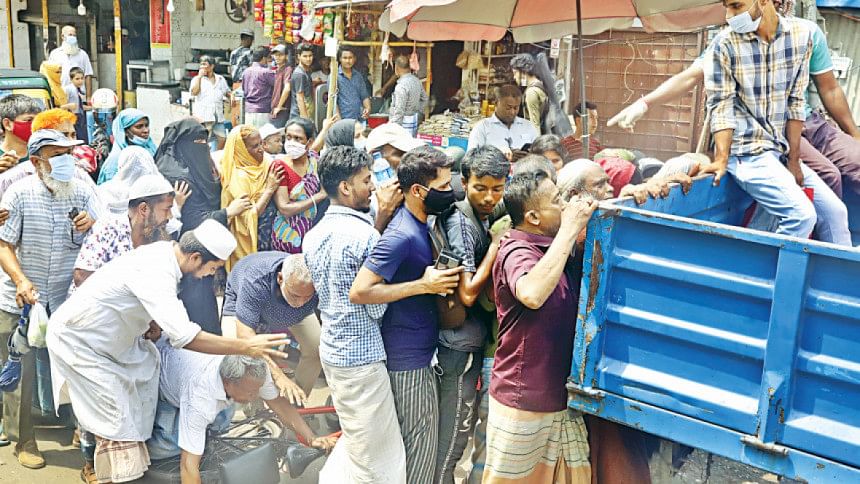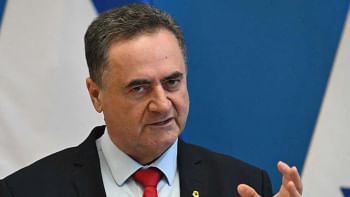4 crore have European purchasing power, but what of the rest?

There was a time when meat from two cows used to be sold every day at a certain market in Gazipur. Over the last year, the sales have reduced by half. Sellers say there are now very few buyers.
Rising commodity prices forced a lot of people to scrap meat from their menus, and thus, some meat shops do not get even a single buyer throughout the day.
This dire situation has been depicted in a report published on The Daily Star on October 23.
Is this just an isolated case?
Commerce Minister Tipu Munshi believes that four crore of the nation's 17 crore people have "European" purchasing power. According to him, these four crore people can afford the current prices.
However, we hope that the commerce minister will also consider the state of the other 13 crore people.
Recently, he made a decisive comment on their fate. "There is currently no room for price reductions in food items."
He also expressed optimism that prices would become normal at the beginning of next year.
It is obvious that prices are not going down at the moment, but such a statement would be incomplete without also saying that prices will increase. And, the current reality of the country tells us that the optimistic forecast of prices going down is not likely to come true.
Munshi knows that he can get away with saying such things, and our politics is ever forgiving. He won't have to answer for it. There is another reason behind this optimism. By saying something like that, he can stay unconcerned for a few more months. Although prices will be rising daily, he can comfortably say, "I already told you so."
The, later, he can come up with another new set of excuses.
Any upward movement in prices will not affect the four crore people with European purchasing power. But what of the remaining 13 crore?
Our finance minister took things to a different level. A few months ago, he annoyingly mentioned that our economy is doing "too well", and what more could it possibly achieve? He does not even believe that the nation's economy is doing poorly. He also does not believe that there are poor people in the nation and their number is rising.
Before the Covid-19 pandemic, the nation had about two and half crore destitute, but since the pandemic, the number has doubled. Surveys conducted by established private organisations confirm it. A small portion of this five-crore population are now getting essentials at a subsidised price. But what about the rest?
People from middleincome and lower-middle income households are an enigma -- no one knows their number and absolutely nothing about their pains and sufferings is clear. One imagines that they cannot work as day labourers or stand in TCB lines without feeling indignity. The commerce minister or the finance minister will never realise their plight.
Whenever a specific product becomes expensive, a certain section asks what would happen if we not consume it? It is alright to avoid a product on a temporary basis. But price hikes are rarely temporary.
The commerce minister set the price for eggs at Tk 12 and gave permission to import eggs. Months passed but not a single egg was imported, and eggs are now getting sold at Tk 13-15.
In an unprecedented trend, people are now buying 250 grams of meat and pieces of hilsa. One can say that people are now only buying the amount they need, and there's no wastage. However, the people in power do not want to acknowledge the actual, brutal truth behind it.
Previously people had the purchasing power to buy the whole hilsa, but now they are buying only a few pieces. The person who used to buy two kilogrammes of meat is now trying to make do with merely 250 grams. The prices increased, but the incomes have not. People have lost their purchasing power.
Instead of accepting this reality, the government is playing a cruel game.
When eggs became pricier, we heard the advice to boil and preserve them. Even if we don't seek scientific explanation or ask for details, we can simply ask: what kind of solution is this?
We will be asked to preserve food items in different innovative ways, but the "prices will not drop" -- is this the new reality?
Price of essentials have gone way beyond the purchasing power of the general population. Such innovations are not a means to express empathy; it is a kind of cruel joke.
Vegetables are expensive now -- the least expensive one costs Tk 80 per kg. The government set the price for products like onions at Tk 64-65 and potatoes at Tk 35-36, but in reality these are being sold at Tk 90-100 and Tk 45-55 respectively. The government could not implement these prices in the market.
One must inevitably question the logic behind setting a non-implementable price. But this too cannot be questioned, and the commerce minister can confidently tell us that prices will not reduce.
On the one hand, people are getting steamrolled by rising prices, and on the other, those in the state machinery are making people's lives more miserable with their words.
But it was the responsibility of these people to keep the lives of ordinary people tolerable.
Translated from Bangla by Mohammed Ishtiaque Khan

 For all latest news, follow The Daily Star's Google News channel.
For all latest news, follow The Daily Star's Google News channel. 



Comments